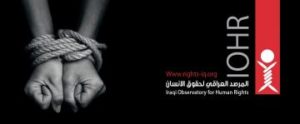 Abdul Mahdi’s new government knows that the Saudi-Qatari political and economic competition for Iraq is at its peak, Al-Monitor reports.
Abdul Mahdi’s new government knows that the Saudi-Qatari political and economic competition for Iraq is at its peak, Al-Monitor reports.
“At this time, Iraq needs the support of both rich states to reconstruct the freed Sunni areas that both Riyadh and Doha have warned against ‘marginalizing’,” writes Iraqi journalist Mustafa Saadoun, the founder and director of the Iraqi Observatory for Human Rights. “Yet the question is whether the new government will be capable of balancing ties between both sides.”
 Senior researcher at the National Endowment for Democracy Rahman al-Jobori told Al-Monitor, “Iraq must ignore the Saudi-Qatari rivalry and decide on its vision for the region and itself. It is therefore important that Iraq bases its ties on what interests it as opposed to foreign interests.”
Senior researcher at the National Endowment for Democracy Rahman al-Jobori told Al-Monitor, “Iraq must ignore the Saudi-Qatari rivalry and decide on its vision for the region and itself. It is therefore important that Iraq bases its ties on what interests it as opposed to foreign interests.”
 In his latest book, Inside the Arab State, Mehran Kamrava employs a multidisciplinary approach to examine a broad range of political, economic, and social variables behind some of the central questions concerning the nature of power and politics before and after 2011, when the Arab Spring began in the Arab world, the Arab Center notes.
In his latest book, Inside the Arab State, Mehran Kamrava employs a multidisciplinary approach to examine a broad range of political, economic, and social variables behind some of the central questions concerning the nature of power and politics before and after 2011, when the Arab Spring began in the Arab world, the Arab Center notes.
 The book focuses on the institutional make-up and composition of Arab states and how they have sought to establish coercive and ideological apparatuses enabling them to rule over society, Georgetown University adds. Kamrava maintains that critical junctures provide a window of opportunity for state leaders to craft institutions and institutional arrangements that enable them to rule over society. Once these institutional arrangements are in place, two sets of dynamics begin to occur:
The book focuses on the institutional make-up and composition of Arab states and how they have sought to establish coercive and ideological apparatuses enabling them to rule over society, Georgetown University adds. Kamrava maintains that critical junctures provide a window of opportunity for state leaders to craft institutions and institutional arrangements that enable them to rule over society. Once these institutional arrangements are in place, two sets of dynamics begin to occur:
- At one level, as institutions mature and as their institutions become routine, they begin to develop lives of their own. Slowly, they assume internal dynamics that move them in one direction or another.
- The actors who created these institutions, however, may not always approve of the direction in which they are moving. Thus a potential area of tension develops between agency and structure—what state actors wish to see of the institutions of the state and how these institutions actually behave.
Please join the Arab Center on Thursday, December 6, 2018 at 10:00 AM for a conversation with Dr. Mehran Kamrava. Arab Center, 800 10th Street, NW, Suite 650, Washington, DC 20001. RSVP







